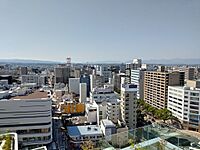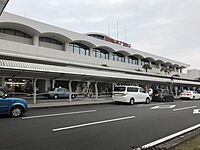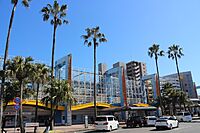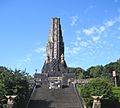Miyazaki (city) facts for kids
Quick facts for kids
Miyazaki
宮崎市
|
|||||||||||
|---|---|---|---|---|---|---|---|---|---|---|---|
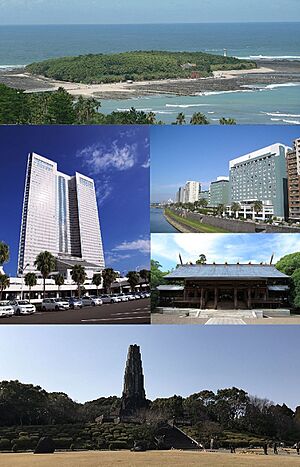
|
|||||||||||
|
|||||||||||
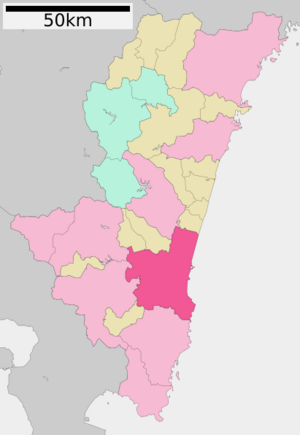 |
|||||||||||
| Country | Japan | ||||||||||
| Region | Kyushu | ||||||||||
| Prefecture | Miyazaki | ||||||||||
| Area | |||||||||||
| • Total | 643.67 km2 (248.52 sq mi) | ||||||||||
| Population
(September 1, 2023)
|
|||||||||||
| • Total | 397,381 | ||||||||||
| • Density | 617.368/km2 (1,598.975/sq mi) | ||||||||||
| Time zone | UTC+09:00 (JST) | ||||||||||
| City hall address | 1-1-1 Tachibana-dōri Nishi, Miyazaki-shi, Miyazaki-ken 880-8505 | ||||||||||
| Climate | Cfa | ||||||||||
|
|||||||||||
Miyazaki (宮崎市, Miyazaki-shi) is an important city in Japan. It is the capital of Miyazaki Prefecture on the island of Kyushu. As of September 2023, about 397,381 people live in Miyazaki. The city covers an area of about 643.67 square kilometers.
Contents
- Exploring Miyazaki's Location and Surroundings
- Miyazaki's Weather and Climate
- Population Growth in Miyazaki
- A Brief History of Miyazaki City
- Miyazaki's Economy and Industries
- Learning and Education in Miyazaki
- Getting Around Miyazaki
- Miyazaki's Sister Cities Around the World
- Fun Places to Visit in Miyazaki
- Images for kids
- Famous People from Miyazaki
- See also
Exploring Miyazaki's Location and Surroundings
Miyazaki is located at the southern end of the Miyazaki Plain. The Ōyodo River flows right through the city. To the east, Miyazaki borders the Hyūga Sea. Most of the city is flat land, except for the southern part, which has mountains.
Neighboring Cities and Towns
Miyazaki is surrounded by several other places in Miyazaki Prefecture:
- Aya
- Kobayashi
- Kunitomi
- Mimiata
- Miyakonojō
- Nichinan
- Saito
- Shintomi
Miyazaki's Weather and Climate
Miyazaki has a humid subtropical climate. This means it has hot, humid summers and cool winters. During summer, typhoons can sometimes hit the city. For example, on October 16, 1939, a typhoon brought a huge amount of rain, about 587.2 mm (23.12 inches), in just one day! The wettest month ever recorded was September 1886, with 1259.3 mm (49.58 inches) of rain. The driest month was December 1988, which had no rain at all.
| Climate data for Miyazaki (1991−2020 normals, extremes 1886−present) | |||||||||||||
|---|---|---|---|---|---|---|---|---|---|---|---|---|---|
| Month | Jan | Feb | Mar | Apr | May | Jun | Jul | Aug | Sep | Oct | Nov | Dec | Year |
| Record high °C (°F) | 25.1 (77.2) |
25.4 (77.7) |
28.1 (82.6) |
31.7 (89.1) |
34.3 (93.7) |
36.2 (97.2) |
37.7 (99.9) |
38.0 (100.4) |
36.9 (98.4) |
33.3 (91.9) |
30.3 (86.5) |
25.0 (77.0) |
38.0 (100.4) |
| Mean daily maximum °C (°F) | 13.0 (55.4) |
14.1 (57.4) |
17.0 (62.6) |
21.1 (70.0) |
24.6 (76.3) |
26.7 (80.1) |
31.3 (88.3) |
31.6 (88.9) |
28.5 (83.3) |
24.7 (76.5) |
19.8 (67.6) |
15.0 (59.0) |
22.3 (72.1) |
| Daily mean °C (°F) | 7.8 (46.0) |
8.9 (48.0) |
12.1 (53.8) |
16.4 (61.5) |
20.3 (68.5) |
23.2 (73.8) |
27.3 (81.1) |
27.6 (81.7) |
24.7 (76.5) |
20.0 (68.0) |
14.7 (58.5) |
9.7 (49.5) |
17.7 (63.9) |
| Mean daily minimum °C (°F) | 3.0 (37.4) |
4.0 (39.2) |
7.4 (45.3) |
11.7 (53.1) |
16.3 (61.3) |
20.1 (68.2) |
24.1 (75.4) |
24.5 (76.1) |
21.4 (70.5) |
15.8 (60.4) |
10.1 (50.2) |
5.0 (41.0) |
13.6 (56.5) |
| Record low °C (°F) | −7.5 (18.5) |
−6.6 (20.1) |
−4.1 (24.6) |
−1.5 (29.3) |
3.1 (37.6) |
9.2 (48.6) |
16.0 (60.8) |
16.4 (61.5) |
9.7 (49.5) |
2.6 (36.7) |
−2.7 (27.1) |
−7.2 (19.0) |
−7.5 (18.5) |
| Average precipitation mm (inches) | 72.7 (2.86) |
95.8 (3.77) |
155.7 (6.13) |
194.5 (7.66) |
227.6 (8.96) |
516.3 (20.33) |
339.3 (13.36) |
275.5 (10.85) |
370.9 (14.60) |
196.7 (7.74) |
105.7 (4.16) |
74.9 (2.95) |
2,625.5 (103.37) |
| Average snowfall cm (inches) | 0 (0) |
0 (0) |
0 (0) |
0 (0) |
0 (0) |
0 (0) |
0 (0) |
0 (0) |
0 (0) |
0 (0) |
0 (0) |
0 (0) |
0 (0) |
| Average precipitation days (≥ 0.5 mm) | 6.6 | 8.1 | 11.5 | 11.2 | 11.4 | 17.2 | 12.8 | 13.1 | 13.6 | 9.2 | 8.1 | 6.1 | 128.9 |
| Average relative humidity (%) | 66 | 67 | 68 | 70 | 74 | 82 | 78 | 80 | 80 | 76 | 74 | 69 | 74 |
| Mean monthly sunshine hours | 192.6 | 170.8 | 185.6 | 186.0 | 179.7 | 119.4 | 198.0 | 208.6 | 156.5 | 173.6 | 167.0 | 183.9 | 2,121.7 |
| Source: Japan Meteorological Agency | |||||||||||||
| Climate data for Miyazaki Airport (2003−2020 normals, extremes 2003−present) | |||||||||||||
|---|---|---|---|---|---|---|---|---|---|---|---|---|---|
| Month | Jan | Feb | Mar | Apr | May | Jun | Jul | Aug | Sep | Oct | Nov | Dec | Year |
| Record high °C (°F) | 24.3 (75.7) |
25.0 (77.0) |
28.4 (83.1) |
31.3 (88.3) |
35.4 (95.7) |
34.6 (94.3) |
38.5 (101.3) |
38.6 (101.5) |
35.2 (95.4) |
33.1 (91.6) |
29.1 (84.4) |
24.9 (76.8) |
38.6 (101.5) |
| Mean daily maximum °C (°F) | 13.0 (55.4) |
14.4 (57.9) |
17.2 (63.0) |
21.3 (70.3) |
24.4 (75.9) |
26.5 (79.7) |
30.8 (87.4) |
31.4 (88.5) |
28.6 (83.5) |
24.6 (76.3) |
20.0 (68.0) |
15.0 (59.0) |
22.3 (72.1) |
| Daily mean °C (°F) | 8.0 (46.4) |
9.6 (49.3) |
12.4 (54.3) |
16.7 (62.1) |
20.5 (68.9) |
23.2 (73.8) |
27.2 (81.0) |
27.9 (82.2) |
25.2 (77.4) |
20.6 (69.1) |
15.4 (59.7) |
9.9 (49.8) |
18.1 (64.5) |
| Mean daily minimum °C (°F) | 3.4 (38.1) |
4.9 (40.8) |
7.6 (45.7) |
12.1 (53.8) |
16.8 (62.2) |
20.4 (68.7) |
24.3 (75.7) |
25.0 (77.0) |
22.1 (71.8) |
16.6 (61.9) |
10.9 (51.6) |
5.2 (41.4) |
14.1 (57.4) |
| Record low °C (°F) | −3.8 (25.2) |
−3.8 (25.2) |
−1.1 (30.0) |
3.2 (37.8) |
8.0 (46.4) |
14.3 (57.7) |
18.1 (64.6) |
20.1 (68.2) |
13.7 (56.7) |
6.8 (44.2) |
0.8 (33.4) |
−2.9 (26.8) |
−3.8 (25.2) |
| Average precipitation mm (inches) | 68.2 (2.69) |
111.9 (4.41) |
144.1 (5.67) |
166.9 (6.57) |
225.1 (8.86) |
505.9 (19.92) |
320.9 (12.63) |
261.8 (10.31) |
390.7 (15.38) |
240.6 (9.47) |
126.8 (4.99) |
83.6 (3.29) |
2,646.5 (104.19) |
| Average precipitation days (≥ 1.0 mm) | 5.6 | 8.5 | 9.9 | 9.3 | 10.3 | 16.9 | 10.8 | 12.7 | 13.7 | 8.7 | 8.1 | 5.4 | 119.9 |
| Source: Japan Meteorological Agency | |||||||||||||
Population Growth in Miyazaki
The population of Miyazaki has grown steadily over the years. According to the Japanese census data, in 2020, there were 401,339 people living in Miyazaki. The city has been counting its population since 1920.
| Historical population | ||||||||||||||||||||||||||||||||||||||||||||||||||||||||||||||||||||||
|---|---|---|---|---|---|---|---|---|---|---|---|---|---|---|---|---|---|---|---|---|---|---|---|---|---|---|---|---|---|---|---|---|---|---|---|---|---|---|---|---|---|---|---|---|---|---|---|---|---|---|---|---|---|---|---|---|---|---|---|---|---|---|---|---|---|---|---|---|---|---|
|
|
|||||||||||||||||||||||||||||||||||||||||||||||||||||||||||||||||||||
| Miyazaki population statistics | ||||||||||||||||||||||||||||||||||||||||||||||||||||||||||||||||||||||
A Brief History of Miyazaki City
The area where Miyazaki is located was once part of an old region called Hyūga Province. In 1551, a busy market town named Jogasaki grew on the Ōyodo River. It became a successful trading spot.
During the Edo period, this area was controlled by different rulers. After 1871, when the old feudal system ended, Miyazaki Prefecture was formed in 1873. A small village called Kitta-Beppu was chosen as the new capital. The town of Miyazaki was officially created on May 1, 1889. As more railroads were built, many new people moved to the area.
Miyazaki became a city on April 1, 1924, after joining with nearby towns and villages. On April 1, 1998, Miyazaki was given special status as a Core City. This gave it more power to make its own local decisions. Later, in 2006 and 2010, more towns merged with Miyazaki, making the city even larger.
Miyazaki's Economy and Industries
Miyazaki is mainly a center for business and shopping in its region. While there are plans to develop technology industries, Miyazaki City does not have many large factories. This is partly because it's not very easy to transport goods to and from other parts of Japan.
However, the city has been working hard to attract companies that deal with information technology. In the countryside areas of Miyazaki, farming is still very important. Farmers grow crops like tomatoes, peppers, and cucumbers. There are also factories that process food. Solaseed Air, a regional airline, has its main office in Miyazaki.
Learning and Education in Miyazaki
Miyazaki offers many options for education, from elementary schools to universities.
Colleges and Universities
Miyazaki is home to several colleges and universities:
- Minami Kyushu Junior College
- Minami Kyushu University
- Miyazaki Gakuen Junior College
- Miyazaki International College
- Miyazaki Municipal University
- Miyazaki Prefectural Nursing University
- Miyazaki Sangyo-keiei University
- University of Miyazaki
Schools for Younger Students
The city government runs 48 public elementary schools and 25 public junior high schools. The Miyazaki Prefectural Board of Education operates one public junior high school and ten public high schools. There are also schools connected to Miyazaki University and several private schools. For students with special needs, the prefecture has five special education schools.
Getting Around Miyazaki
Miyazaki has good transportation options, including an airport and a railway system.
Airports
- Miyazaki Airport is the main airport serving the city.
Railways
The JR Kyushu operates several train lines through Miyazaki:
- Nippō Main Line: Sadowara - Hyūga-Sumiyoshi - Hasugaike - Miyazaki-Jingū - Miyazaki - Minami-Miyazaki - Kanō - Kiyotake - Hyūga-Kutsukake - Tano
- Nichinan Line: Minami-Miyazaki - Tayoshi - Minamikata - Kibana - Undōkōen - Sosanji - Kodomonokuni - Aoshima - Oryūzako - Uchiumi - Kouchiumi
- Miyazaki Kūkō Line (Miyazaki Airport Line): (Minami-Miyazaki) - Tayoshi - Miyazaki Airport
Highways
Major highways connect Miyazaki to other parts of Japan:
 Miyazaki Expressway
Miyazaki Expressway Higashikyushu Expressway
Higashikyushu Expressway National Route 10
National Route 10 National Route 219
National Route 219 National Route 220
National Route 220 National Route 268
National Route 268 National Route 269
National Route 269 National Route 448
National Route 448
Miyazaki's Sister Cities Around the World
Miyazaki has special partnerships with five sister cities, both in Japan and other countries. These partnerships help promote friendship and understanding.
In Japan
 Kashihara, Nara, since February 11, 1966
Kashihara, Nara, since February 11, 1966 Tano, Kōchi, since July 8, 1989
Tano, Kōchi, since July 8, 1989 Daisen, Akita, since June 3, 2001
Daisen, Akita, since June 3, 2001
International Sister Cities
 Waukegan, Illinois, United States, since May 3, 1990
Waukegan, Illinois, United States, since May 3, 1990 Virginia Beach, Virginia, United States, since May 25, 1992
Virginia Beach, Virginia, United States, since May 25, 1992 Boeun County, North Chungcheong, South Korea, since August 6, 1993
Boeun County, North Chungcheong, South Korea, since August 6, 1993 Huludao, Liaoning, China, since May 16, 2004
Huludao, Liaoning, China, since May 16, 2004 Taoyuan, Taiwan, since October 5, 2017
Taoyuan, Taiwan, since October 5, 2017
Fun Places to Visit in Miyazaki
Miyazaki has many interesting spots for tourists and locals to enjoy.
- Miyazaki Prefectural Office became famous when a celebrity, Hideo Higashikokubaru, became the governor.
- Miyazaki-jingū is a sacred shrine in the city center. It is dedicated to Japan's first emperor, Jinmu.
- Heiwadai Tower or "Peace Tower" is a must-see in the large Heiwadai Park. It was originally built to symbolize Japanese expansion but was renamed for peace after World War II.
- Aoshima Island has unique rock formations called the Devil's Washboard. It's a peaceful beach area popular for relaxing and playing. The Aoshima Subtropical Botanical Garden is also nearby and free to visit.
- The Tom Watson Golf Course was designed by famous American golfer Tom Watson.
- Phoenix Zoo is a zoo with live animals and an amusement park for kids.
- The Citizen's Forest is a big park near the Phoenix Zoo. It has the Misogi-ike, or Pond of Purification, which is important in Japanese legend.
- The Ikime Kofun Cluster is a group of ancient burial mounds. You can visit the Ikime-no-mori Yukokan, an activity center, to learn about their history.
- Miyazaki City is known for its excellent surfing conditions all year round. Kisakihama Beach, Aoshima Beach, and Shirahama Beach are popular surfing spots within the city.
- Kaeda Valley is a free public park and nature reserve. It has walking paths and hiking trails for different skill levels. Kaeda is a forest area with a river flowing through it.
- The Kirishima Sports Complex has many sports facilities. These include running trails, a stadium, tennis courts, and an outdoor ropes course. It hosts various sports events, like the Aoshima Taiheiyo Marathon.
- Miyazaki Mango is a world-famous type of mango that looks like the rising sun. It's also known as the Sun Egg and is often given as a gift.
- Florante Miyazaki is a botanical park with beautiful flower displays. It's also popular for its winter lights show.
- Birthplace of Yasui Sokken, a National Historic Site.
- Sadowara Castle ruins, a National Historic Site.
- Mukasa Castle ruins, a National Historic Site.
- Motonobaru Site, a National Historic Site.
- Udo Shrine, a National Historic Site.
- Ikime Shrine, dedicated to Emperor Ōjin and Taira no Kagekiyo.
Images for kids
Famous People from Miyazaki
Many talented people come from Miyazaki:
- Yui Asaka (singer and actress)
- Sky Brown (skateboarder)
- Ryunosuke Haga (judoka)
- Kosei Inoue (judoka)
- Shinzo Koroki (soccer player)
- Kawaguchi Yurina (singer, former member of X21)
See also
 In Spanish: Miyazaki (Miyazaki) para niños
In Spanish: Miyazaki (Miyazaki) para niños
 | Dorothy Vaughan |
 | Charles Henry Turner |
 | Hildrus Poindexter |
 | Henry Cecil McBay |





